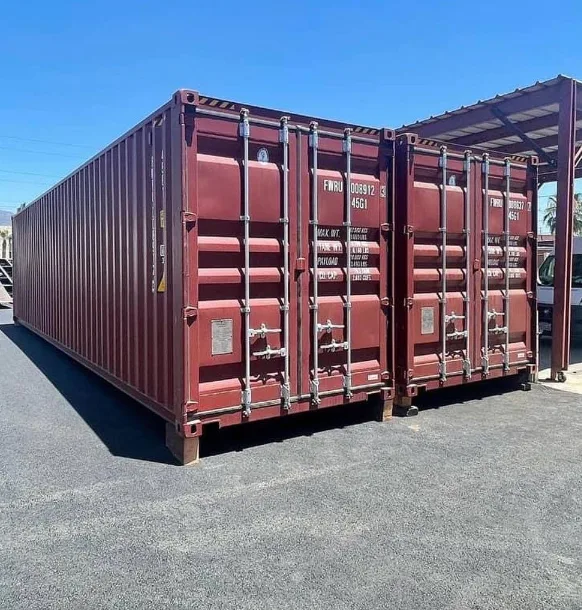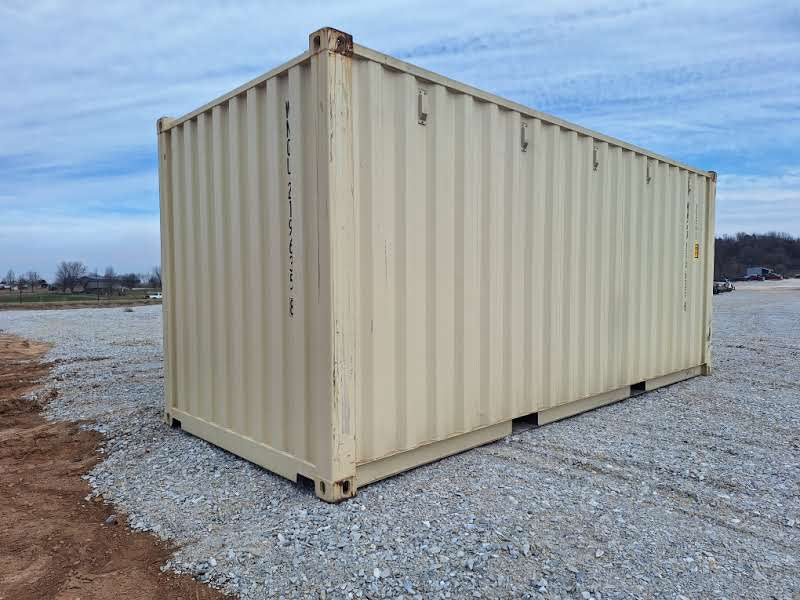Why You Should Lease New Shipping Container 40 x 8 x 9.6 for Your Pop-Up Café
Why You Should Lease New Shipping Container 40 x 8 x 9.6 for Your Pop-Up Café
Blog Article
The Ultimate Guide to Choosing the Right Shipping Container for Your Demands
When it involves choosing the best shipping container, understanding your certain needs is necessary. You'll wish to take right into account aspects like size, kind, and material to ensure you make the ideal selection. From conventional dimensions to specialized alternatives, there's a whole lot to discover. Plus, budgeting for both the container and any kind of adjustments can make a big distinction. Allow's break down the essential aspects to help you discover the ideal suitable for your needs.
Understanding Delivery Container Sizes
When you're picking a delivery container, comprehending the different sizes offered is crucial for making the ideal choice. Delivering containers commonly are available in typical lengths of 20 and 40 feet, but you'll also discover various other measurements. Knowing the dimension you need relies on what you intend to shop or transport.If you're moving smaller things, a 20-foot container may be perfect, while bigger shipments often call for a 40-foot container. The height can also vary; high dice containers supply added vertical space, which can be valuable for taller goods.Before deciding, measure your cargo, and consider exactly how much room you'll require for filling and discharging. Always element in potential future demands-- selecting a somewhat larger container may conserve you trouble down the line. Eventually, selecting the right size will certainly improve effectiveness and ensure your products are safe throughout transit
Kinds of Delivery Containers Available
There are a number of kinds of shipping containers available, each made for specific objectives and cargo requirements. The typical completely dry container is versatile, best for basic freight. If you're delivering disposable items, take into consideration a cooled container, which keeps a controlled temperature. For oversized things, high dice containers offer added height, accommodating taller loads.If you require to carry heavy equipment or devices, level shelf containers offer a strong base without wall surfaces. Open-top containers enable for easy loading of high cargo, with a detachable tarp covering for defense. If you're looking for flexibility, take into consideration a retractable container that can be conveniently kept when not in use.Lastly, specialized containers like container containers are used for liquids, while vented containers are designed for bulk cargo that needs ventilation. Knowing your freight type will certainly help you choose the best container to meet your delivery needs effectively.
Product Factors To Consider for Sturdiness
When selecting a delivery container, the product plays a vital function in its sturdiness. You'll wish to weigh the benefits of steel versus aluminum, particularly regarding rust resistance. Recognizing these elements can assist you make an extra educated option for your delivery needs.
Steel vs. Light weight aluminum Containers
Just how do you pick between steel and aluminum containers for your shipping needs? Start by considering durability. Steel containers are durable and offer superb strength, making them suitable for heavy lots and extreme problems. They resist damages from influences and are often much less pricey, which can be a major variable for budget-conscious buyers.On the other hand, light weight aluminum containers are light-weight, which can conserve you on delivery prices. They're much easier to maneuver and are a terrific choice if you need to transport products regularly. Aluminum is typically a lot more expensive and much less robust than steel. Consider your certain demands thoroughly, including weight, expense, and the kind of freight you'll be delivery, to make the appropriate choice for your situation.
Rust Resistance Variables
Selecting the right material does not simply include weight and cost; deterioration resistance plays a substantial function in sturdiness. When selecting a shipping container, take into consideration the atmosphere it'll deal with. Steel containers, while solid, can corrosion if not appropriately treated. Try to find choices with safety finishes or galvanization to boost their life expectancy. Light weight aluminum, on the various other hand, uses natural rust resistance, making it optimal for coastal locations or moist problems. It can be much more pricey. In addition, examine the container's usage-- if it'll be subjected to chemicals or severe weather condition, prioritize materials that can withstand these conditions. Spending in a corrosion-resistant container currently can save you from expensive repairs or replacements down the line. Select intelligently for long-lasting advantages.
Alterations and Modification Options
Shipping containers aren't simply for carrying products; they can be transformed to fulfill your particular requirements via various adjustments and modification options. You can convert a standard container into a comfy workplace, a momentary retail store, or perhaps an individual gym. The possibilities are almost endless.Think about including windows, insulation, or ventilation to boost convenience. You may likewise take into consideration electrical wiring, plumbing, and even custom-made shelving to boost functionality. If protection's a problem, enhanced locks can provide peace of mind.For aesthetic allure, you can repaint the container or include an one-of-a-kind design to make it stand out. Don't ignore flooring choices-- whether you desire resilient plywood or something much more advanced, it can raise the space.Ultimately, tailoring your shipping container to fit your requirements can boost use and produce a distinct environment that shows your style.
Evaluating Your Transport Requirements
When it comes to utilizing your changed shipping container, recognizing your transportation requires is essential. Beginning by determining what you'll be shipping-- whether it's hefty tools, retail goods, or personal products. Each sort of freight has various requirements relating to dimension, weight, and accessibility.Next, take into consideration the distance and mode of transport. Are you shipping in your area, nationally, or internationally? This impacts the container's style and performance. If you're using vehicles, guarantee your container fits standard dimensions for simple loading and unloading.Additionally, consider transportation conditions. Will your products need unique security from weather condition or temperature level fluctuations? If so, you may require insulation or ventilation attributes in your container.Lastly, evaluate exactly how typically you'll be carrying products. Frequent shipments may require an useful reference extra resilient and flexible container to meet continuous needs. By addressing these aspects, you'll be well-prepared to pick the right delivery container for your demands.
Budgeting for Your Shipping Container
Establishing a spending plan for your delivery container is necessary for guaranteeing a smooth buying process. First, figure out just how much you can afford to invest. Costs can vary significantly based on size, problem, and check here type. New containers commonly set you back extra, however used ones can offer considerable savings.Next, take into consideration any type of added costs you might incur, such as transport fees, delivery charges, and alterations. If you plan to personalize the container, element in those expenditures also. Study different suppliers to contrast rates and locate the best deal that satisfies your needs.Don' t fail to remember to consist of any kind of licenses or guidelines that may put on your acquisition and use the container. By clearly detailing your spending plan, you'll be better prepared to make enlightened decisions, guaranteeing you get the best container without damaging the bank.
Upkeep and Look After Long life
To guarantee your delivery container lasts for many years, regular upkeep is key. Begin by evaluating the outside for rust, dents, and damages. If you find any kind of problems, address them right away to avoid additional wear and tear. Tidy the container regularly, both in and out, to eliminate dust, debris, and moisture that can cause corrosion.Ensure the doors seal appropriately and lubricate the hinges to avoid corrosion and sticking. If you're using the container for storage, consider including air flow to reduce humidity and mold and mildew development. For added protection, apply a rust-inhibiting paint or sealer annually.If your container's situated in a severe environment, like seaside locations, you might need to boost upkeep regularity. Watch on the floor covering, also; any indications of wear must be fixed today. With these easy steps, you'll prolong the life of your delivery container considerably.
Often Asked Concerns
Exactly how Do I Discover a Trusted Shipping Container Vendor?
To find a dependable shipping container distributor, beginning by investigating on-line evaluations, requesting referrals from friends or market calls, and contrasting costs. Constantly inspect their credentials and assurance they supply top quality containers that fulfill your demands.

Can I Lease a Delivery Container Rather Than Buying?
Yes, you can absolutely rent out a delivery container instead of purchasing one. Several suppliers offer rental alternatives, which can conserve you money and offer versatility if you just require it for a short duration.
What Permits Are Required for Container Positioning?

Are Shipping Containers Weatherproof and Appropriate for Outdoor Storage?
Yes, shipping containers are usually weatherproof, created to endure rough problems. Their robust building and construction keeps your items protected and dry, making them suitable for outdoor storage space. Just guarantee appropriate ventilation to protect against dampness buildup inside.
Just how Do I Deliver a Shipping Container When Bought?

Report this page